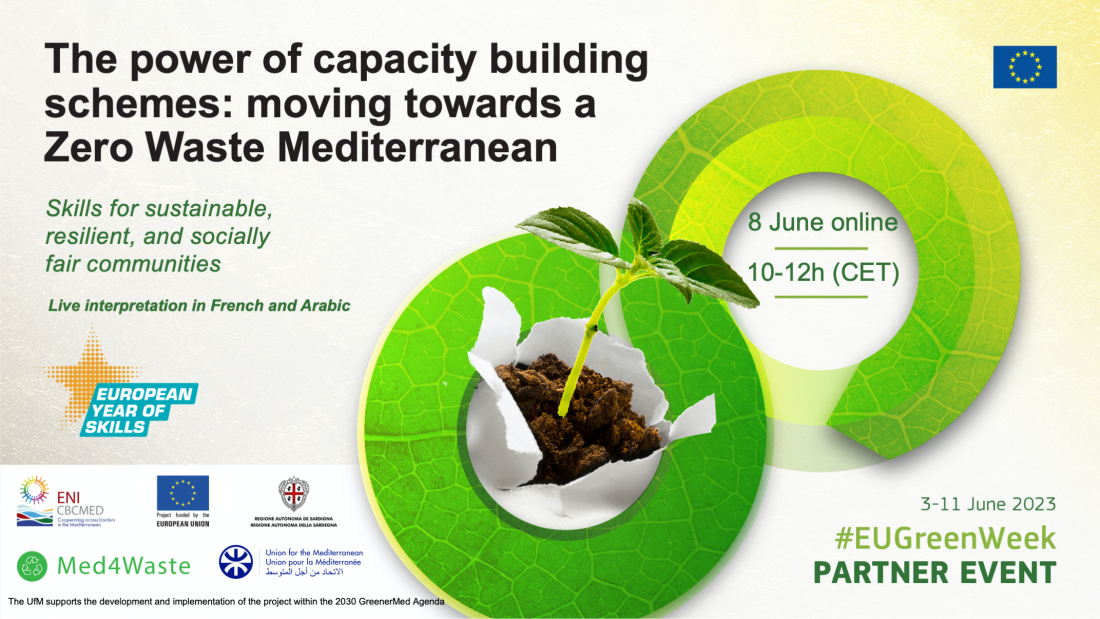Med4Waste organised a side-event during the European Green Week to discuss about capacity building and green skills for a zero waste Mediterranean

In the framework of the Med4Waste project, BETA Technological Center (UVic-UCC) organised an online event entitled "The power of capacity building schemes: moving towards a zero waste Mediterranean" (Thursday, 8th June 2023) that has been part of the program of the EU Green Week 2023 organized, as every year, by the European Commission.
The moderator of the session was Mercè Boy Roura, Head of the Governance for Sustainability Area at BETA TC and Med4Waste Project Coordinator. The main objective of the event was to showcase and learn from various initiatives that are being carried out throughout the Mediterranean region to improve the necessary skills for sustainable waste management at different levels, from providing direct technical and financial support to local needs, to strengthening skills through meaningful capacity building schemes, and through mainstreaming good practices into public policies and municipal waste management plans.
During the opening session, on speeding up the transition towards a Zero Waste Mediterranean by strengthening local governance, Joumana Sweiss, on behalf of the ENI CBC Med program, highlighted 2 aspects: the importance of trainings and capacity building schemes and to demonstrate to local decision-making bodies the importance of the pilots implemented through different ENI CBC MED projects and their capacity to be replicated. She gave examples of some ENI CBC MED funded projects which tackle the textile, waste and demolition sectors as well as projects of social inclusion that contribute to build capacities in the Mediterranean towards zero waste.
In this context, Aleix Valls from BETA TC followed up with some of the running activities being carried out by Med4Waste, especially the launch of the online course on waste management and circular economy practices named "Med4ZeroWaste & Circular Economy" that has been developed with the support of the Rezero Foundation and where you can find . If you are interested in learning more about the current insights into circular economy and zero waste practices, and successful actions developed by other ENI CBC Med projects, please register to the course! It is free for all, you can do it at your own pace, and by the end of the summer it will also be available in Arabic.
Noé Viedma, from the MedCities network and Med4Waste partner, presented the project’s Mentoring Scheme, a technical support program that Med4Waste is carrying out in six cities on the southern shore of the Mediterraneannamely, Byrain and Madaba in Jordan; M’Saken and Mahdia in Tunisia; and Akkar Al-Atika and Deir Qanon EiNaher in Lebanon. The activities implemented under this scheme are helping the local governments of these cities to benefit from the knowledge and results of other ENI CBC Med projects working on waste management, such as DECOST, Med-InA or CLIMA, as well as resources for contracting technical support for improving their own waste management plans. Noé was accompanied by representatives of Deir Qanon El Naher and Mahdia municipalities with the interventions of Fatima Yassine and Mohamed Boussoffara, respectively who welcomed the work and efforts of Med4Waste and similar capitalisation projects to provide the necessary tools and platforms to facilitate collaborations between projects, institutions and key stakeholders to share knowledge, good practices and up-to-date research both on centralised and decentralised waste management.



Within the second block of interventions three ENI CBC Med projects shared their insights on how to improve capacity building good practices for better municipal solid waste management. Dolores Matumbu, from E3D-Environment, represented Med-InA project and explained the GD6D innovative solution to offer individualised support to a large number of inhabitants, regarding waste management practices, which has been working to introduce new zero waste strategies in public policies in France. Farah Dawoud, from the Ministry of Local Administration (Jordan), explained the work of the REUSEMED project and its activities to promote the culture of reuse within the creation of local reuse circuits. Lastly, Itxaso Euba, from the Training and Work Foundation (Spain), showcased how, through the SIRCLES project, new jobs for young people and persons with high-risk social exclusion, in the field of municipal waste management under the organic waste community composting have been created.
Finally, the event closed with a roundtable moderated by Haris Paliogiannis, project and policy officer at MIO-ECSDE, to discuss with a diverse set of speakers, how we can effectively support stakeholders for stronger regulatory frameworks and policy incentives on sustainable waste management.
Anis Ismail, Key Environment Expert of the EU-funded project “Water and Environment Support (WES) in the ENI Southern Neighbourhood region”, talked about the perks of a mixed approach when it comes to enhancing the capacity of various stakeholders in the Mediterranean region involved in pollution reduction and water management. Ms. Ghada Ahmadein, Technical Coordinator of the Arab Network for Environment and Development (RAED) shared key elements when it comes to supporting inclusive opportunities for young people to access green jobs and develop green skills in sectors that are closely linked to waste management. On the other hand, Jean-Benoît Bel, Senior Project Manager of ACR+, Association of Cities and Regions for sustainable resource management focused on local and regional authorities and how their specific needs and diverse realities they face should dictate the direction in which waste management plans are being developed. Mr. Mahdi Khomsi, international relations coordinator at BusinessMed and partner of the Med4Waste project summarized the enabling factors to engage the private sector, a key stakeholder for managing and reducing waste, such as public-private partnerships and stronger institutional frameworks that support transparent and fair procurement processes. Victor Carbajal, from BETA TC, showcased the SIMIL Program. Funded by the Joint Research Center of the European Commission, SIMIL is a territorial initiative coordinated from BETA TC itself through which a program of training and capacity building activities will be offered to local governments of Central Catalonia in the field of waste management.









